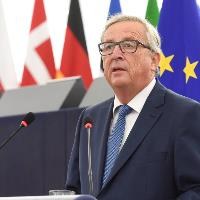(STRASBOURG) – In his 2016 State of the Union address to the European Parliament, EU Commission president Jean-Claude Juncker said the Union was facing key challenges of populism, unemployment and social injustice.
“The next twelve months are decisive if we want to reunite our Union,” said the EU executive’s head. “Europe is a cord of many strands it only works when we are all pulling in the same direction: EU institutions, national governments and national Parliaments alike. And we have to show again that this is possible, in a selected number of areas where common solutions are most urgent. I am therefore proposing a positive agenda of concrete European actions for the next twelve months.”
Following the speech, the refugee crisis, Brexit and counter-terrorism were also debated with political groups’ leaders and other MEPs, who put forward their visions of how to address people’s deepest concerns about the future.
Mr Juncker’s speech – which traditionally kick-starts the dialogue with the Parliament and Council to prepare the Commission Work Programme for the following year – also highlighted the importance of tackling Europe’s migrants crisis and the need to secure the EU’s external borders.
On counter-terrorism, Mr Juncker stressed the need to step up information exchange among national police authorities and proposed, inter alia, strengthening Europol. He also announced a proposal for a European Defence Fund.
This year’s speech served as an outline of the Commission’s presentation to Friday’s informal meeting of the 27 Heads of State or Government in Bratislava, which begins the task of mapping out a European future without the United Kingdom following the Brexit vote.
Mr Juncker’s speech to MEPs was accompanied by adoption of a number of concrete Commission on investment, the Digital Single Market, Capital Markets Union and security, putting words immediately into action.
The External Investment Plan would support investment in EU partner countries, in Africa and the European Neighbourhood, with a view to strengthening partnerships, promoting a new model of participation of the private sector and contributing to achieve the Sustainable Development Goals.
On internet connectivity, the Commission has proposed an overhaul of EU telecoms rules to meet Europeans’ growing connectivity needs and boost Europe’s competitiveness. The proposals are designed to encourage investment in very high-capacity networks and accelerate public access to Wi-Fi for Europeans.
On copyright, the Commission puts forward proposals on the modernisation of copyright to increase cultural diversity in Europe and content available online, while bringing clearer rules for all online players. The proposals will also bring tools for innovation to education, research and cultural heritage institutions.
On the Capital Markets Union, the Commission sets out next steps to accelerate the completion of the Capital Markets Union (CMU), a flagship project of the Juncker Commission to boost jobs and growth in Europe.
On security, the Commission set out how the European Union can enhance security in Europe by improving the exchange of information in the fight against terrorism and strengthening external borders.



